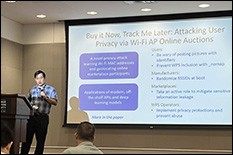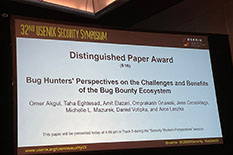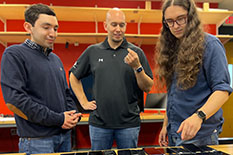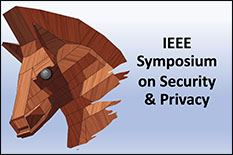News Story
Levin and Rye Win 2025 Caspar Bowden Privacy Award
Published August 4, 2025

A University of Maryland team was recently honored for impactful research uncovering global privacy risks in Wi-Fi-based Positioning Systems (WPS).
Dave Levin, an associate professor of computer science, and Erik Rye, who earned his Ph.D. in computer science in May, received the prestigious 2025 Caspar Bowden Award for Outstanding Research in Privacy Enhancing Technologies.
The award is named in memory of Caspar Bowden, a dedicated privacy advocate and former chief privacy adviser at Microsoft. It recognizes and celebrates research that embodies Bowden’s vision of safeguarding civil liberties through technology.
Levin and Rye were presented with the award during the 2025 Privacy Enhancing Technologies Symposium (PETS), held July 14–19 in Washington, D.C. The honor includes a $3,000 prize and a commemorative statue sponsored by the Caspar Bowden Legacy Fund.
In May 2024, Rye and Levin published a study revealing that Apple’s WPS could allow attackers to track device movements worldwide by querying MAC addresses. The UMD team used this method to track military personnel entering Ukraine, follow refugees’ resettlement, and monitor device loss in Gaza—exposing serious privacy risks in conflict zones.
Their findings led Rye to collaborate with SpaceX, Starlink’s parent company, to implement random identifiers for Starlink devices, enhancing privacy and security in hostile environments.
Levin, who is a core faculty member in the Maryland Cybersecurity Center (MC2), says the Bowden award is meaningful because it underscores the importance of building safer, more privacy-respecting technologies.
“The hardest thing about privacy research is convincing people that privacy matters,” Levin says. “I think this work takes a big step toward showing people how much can be exposed—even something as extreme as troop movements—without users ever opting into sharing their data. I'm incredibly honored to get this award, and it resonates with me because it shows that privacy is an issue that people can relate to.”
Levin was also part of a team recognized this year with the Caspar Bowden runner-up award. The team’s 2023 paper, “How the Great Firewall of China Detects and Blocks Fully Encrypted Traffic,” measured and analyzed a new censorship system used by the Great Firewall of China to block secure communications—an increasingly common strategy to bypass surveillance.
By uncovering how this system worked, the researchers identified several practical circumvention techniques and responsibly shared their findings with developers of anti-censorship tools, helping millions of users evade the firewall’s blocking method.
The MC2-affiliated co-authors on that paper include Danesh Sivakumar, a recent computer science graduate now pursuing his master’s degree; Jack Burg, who earned his undergraduate degree in computer science in 2024; and Kevin Bock, who completed his Ph.D. in computer science in 2022. The paper also received the Best Practical Award at the 2023 Free and Open Communications on the Internet (FOCI) workshop.
—Story by Melissa Brachfeld, UMIACS communications group









